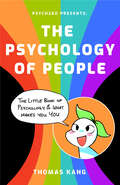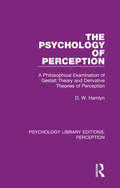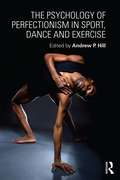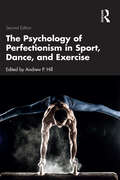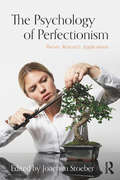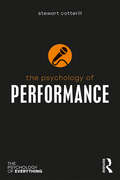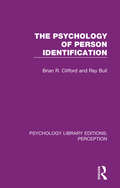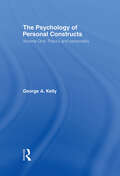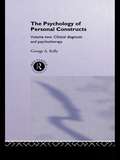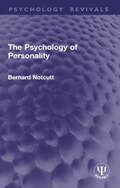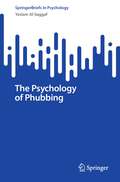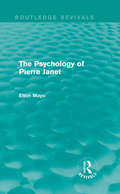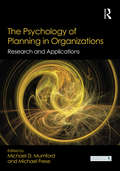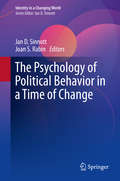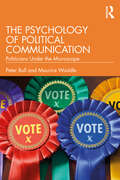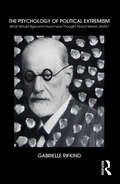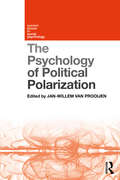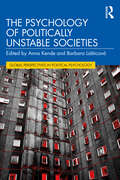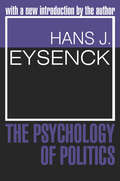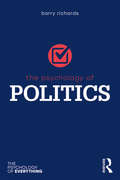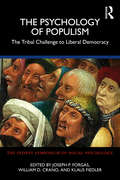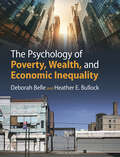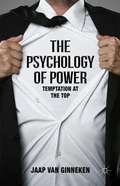- Table View
- List View
The Psychology of Peace Promotion: Global Perspectives on Personal Peace, Children and Adolescents, and Social Justice (Peace Psychology Book Series)
by R. Burke Johnson Mary Gloria C. Njoku Leonard A. JasonThis volume Psychology of Peace Promotion builds on previous volumes of peace psychology, extending its contributions by drawing from peace research and practices from five continents – Africa, Asia, Europe, North America and South America. The book discusses emerging disciplinary and inter-disciplinary theories and actions. Each chapter begins with a theoretical framework for understanding peace, followed by a critical review of peace promotion in a specific setting, and concludes with an illustration of psychological principles or theories in either a narrative format or an empirical investigation. This volume develops, as well as guides, its readers on the epistemology of promoting and sustaining peace in varied settings around the world. This book presents relevant, cutting-edge peace promotion strategies to anyone interested in promoting peace more effectively, including peace practitioners, scholars, teachers, and researchers, as well as the general reader. It presents a number of innovative approaches, illustrating their applications to specific social problems, settings and populations. In addition, this volume has much in store for both academic and practice-based scientists in the field of peace psychology, mental health professionals, administrators, educators, and graduate students from various disciplines. The goal is the promotion and sustenance of peace, using theoretically sound, yet innovative and creative approaches. As expressed by the United Nations Secretary, “peace does not occur by happenstance.” Promoting and sustaining peace requires reflective, thoughtful, and targeted efforts. This book inspires its readers to develop a better understanding of peace and the means of promoting peace in a sustainable way.
The Psychology of People: The Little Book of Psychology & What Makes You You
by Thomas KingEasy-to-Understand Human Psychology with Psych2Go!#1 New Release in Medical Experimental Psychology, Humanist Philosophy. and Popular Experimental PsychologyFinally understand why you do things differently from the rest! Psych2go created this guide to connect the history of human psychology with practical mental health therapy tools to help you thrive in your everyday life.Discover things about yourself! With The Psychology of People, learn about the history of human psychology—and apply it to your own life. Understand your innate need to conform, the roots of your social anxiety, how to heal and grow emotionally—and so much more!An empath’s survival guide to psychology. Written by the creators of the popular youtube channel, blog, and website called Psych2go, The Psychology of People is one of the best mental wellness books that gives practical and applicable methods! From the ethics of experimental psychology to therapy techniques, The Psychology of People helps you develop empathy for yourself and others. Inside, you’ll find:Your very own, therapist on the go, packed with practical methods and experimentsHow to understand and rewire your brain by discovering psychological-based patterns in yourself and othersOne of the best books about psychology, the history of psychology, and the ethics of experimental science If you're looking for psychology books to read, mental wellness books, or books on human psychology, then grab your copy today! If you liked Collective Illusions, Read People Like a Book, or You Can Do All Things, you’ll definitely love The Psychology of People.
The Psychology of Perception: A Philosophical Examination of Gestalt Theory and Derivative Theories of Perception (Psychology Library Editions: Perception #13)
by D. W. HamlynOriginally published in 1957, the primary aim of this study was to shed light upon the logical character of the psychology of perception. D.W. Hamlyn begins by delimiting the field of psychological inquiry into perception, then gives a detailed account of the types of explanation appropriate in the field. He maintains that these explanations have certain important peculiarities which distinguish them from other scientific inquiries. In view of the central importance of Gestalt Theory in this field an account is given of its origins, and its main features are critically discussed. The work should still be of considerable interest to both philosophers and psychologists, as well as to all those interested in the relations between the two subjects.
The Psychology of Perfectionism in Sport, Dance and Exercise
by Andrew HillPerfectionism has been found to play an important yet complex role in sport, dance and exercise. This collection provides a comprehensive and up-to-date account of theory, measurement, research findings, and practitioner issues associated with perfectionism, providing readers with insights into both its benefits and its costs. The book features contributions from many of the leading researchers in the field, and also includes recommendations from experienced practitioners and clinicians on how best to work with perfectionists. <P><P>This book will provide students and researchers in sport and exercise psychology, as well as coaches and instructors in sport, dance and exercise, with an invaluable resource to guide their research and practice.
The Psychology of Perfectionism in Sport, Dance, and Exercise
by Andrew P. HillThis extensively revised and updated edition offers a comprehensive account of the latest research and practice issues relating to perfectionism in sport, dance, and exercise. The new edition of The Psychology of Perfectionism in Sport, Dance, and Exercise includes the latest understanding of perfectionism, its benefits and costs, and support that can be given to those at risk to the perils of perfectionism. The book features contributions from leading researchers and practitioners. With nine new chapters and six updated chapters, the book provides an exhaustive account of research, novel approaches to studying and working with perfectionism, along with critical reflections on key issues and controversies. The book includes a new section on emerging approaches and concepts, as well as a revised section on applied issues and practitioner perspectives offering three new approaches to working with perfectionism. With chapters featuring returning authors and new contributors with novel perspectives, this edition will be invaluable to individuals familiar and unfamiliar with this area of work. This book will be an essential resource and vital guide for students and researchers, as well as practitioners, coaches and instructors in sport, dance, and exercise.
The Psychology of Perfectionism: Theory, Research, Applications
by Joachim StoeberThis milestone text provides a comprehensive and state-of-the art overview of perfectionism theory, research, and treatment from the past 25 years, with contributions from the leading researchers in the field. The book examines new theories and perspectives including the social disconnection model of perfectionism and the 2 × 2 model of perfectionism. It also reviews empirical findings, with a special focus on stress, vulnerability, and resilience, and examines perfectionism in specific populations. Finally, it considers how perfectionism relates to physical health and psychophysiological processes and introduces new approaches to effective prevention and treatment. By increasing our understanding of perfectionism as a complex personality disposition and providing a framework for future explorations, this landmark publication aims to promote further research in this field. It will be invaluable reading for academics, students, and professionals in personality psychology, clinical and counseling psychology, applied psychology, and related disciplines.
The Psychology of Performance (The Psychology of Everything)
by Stewart T. CotterillWhy is performing under pressure often so difficult? What strategies can help us deliver our best performance? How can we boost our self-confidence? The Psychology of Performance explores the key psychological factors that affect our ability to cope under pressure, whether it’s competing in a sport, appearing in front of an audience, or meeting a tight deadline. It looks at how we develop skills through learning and practice, and how self-confidence and decision-making can be sharpened to boost our expertise. The book explains how to develop the best mindset for performance, and shows how factors such as sleep, nutrition, and rest and recovery can influence our moods and how we function. When we need to perform a task with little room for error, The Psychology of Performance helps us to understand how to do this to the best of our ability.
The Psychology of Person Identification (Psychology Library Editions: Perception #6)
by Ray Bull Brian R. CliffordOriginally published in 1978, the laws and procedures governing person identification parades, photofit pictures and the forms of questions asked to obtain a description, had been increasingly called into question. The problem had been highlighted by several well publicised court cases, and considered by the Devlin Committee. This book reviews the status of psychological knowledge at the time concerning the many aspects of person identification and scientifically evaluates the methods and procedures used. Contrary to the popular belief that identification is a simple affair, the authors use the theory and method of psychology to reveal the sources of the difficulties involved in recognising a once-seen person. Estimates of just how good a witness can be are drawn from laboratory studies using face photographs, from mock crime incidents, and from actual criminal cases, for reliability varies markedly in each of these three situations. Both an individual and a social perspective is taken of the eye-witnesses, and research into perception and memory, together with individual differences in such things as cognitive style, personality, suggestibility, age, sex, and ability to form both eidetic and memory images, are examined. The social aspects of stereotypes, the presence of other witnesses and the desire to be a ‘good witness’ are all discussed at length. Finally an extended examination of the possibility of voice parades and changes in identification procedures, together with man-machine interaction techniques, is undertaken.
The Psychology of Personal Constructs: Volume One: Theory and Personality
by George KellyFirst published in 1992. Unavailable for many years this is a reissue of George Kelly's classic work. It is the bible of personal construct psychology written by its founder. The first volume presents the theory of personal construct psychology.
The Psychology of Personal Constructs: Volume Two: Clinical Diagnosis and Psychotherapy
by George KellyFirst published in 1992. Unavailable for many years this is a reissue of George Kelly's classic work. It is the bible of personal construct psychology written by its founder. The second volume presents the implications for clinical practice.
The Psychology of Personality (Psychology Revivals)
by Bernard NotcuttFirst published in 1953, The Psychology of Personality proposes to give an account of the current knowledge about personality at the time; to describe the ideas used by psychologists in this field, the techniques available, the results obtained, and some of their applications. It begins by considering briefly the meaning of the term personality and goes on to explain how this branch of psychology had come to organize itself, and what was its place in the general history of modern thought. Today it can be read in its historical context.This book is a re-issue originally published in 1953. The language used and views portrayed are a reflection of its era and no offence is meant by the Publishers to any reader by this re-publication.
The Psychology of Personhood
by Jack Martin Mark H. BickhardWhat is a person? Surprisingly little attention is given to this question in psychology. For much of the past century, psychology has tended to focus on the systematic study of processes rather than on the persons who enact and embody them. In contrast to the reductionist picture of much mainstream theorising, which construes persons as their mental lives, behaviours or neurophysiological particulars, The Psychology of Personhood presents persons as irreducibly embodied and socially situated beings. Placing the study of persons at the centre of psychology, this book presents novel insights on the typical, everyday actions and experiences of persons in relation to each other and to the broader society and culture. Leading scholars from diverse academic disciplines paint an integrative portrait of the psychological person within evolutionary, historical, cultural, developmental and everyday contexts.
The Psychology of Phubbing (SpringerBriefs in Psychology)
by Yeslam Al-SaggafThis book focuses on the effects of phubbing by parents on their children, partners on their partners, bosses on their employees, friends on their friends, and family members on other family members. Having synthesised the findings from published research about the specific effects on these phubbed individuals in important relationships, the book then presents an exposition of the psychological predictors of phubbing (the triggers), followed by a broader account of the psychological effects of phubbing behaviour. The final chapter looks at the role of social norms in explaining the act of phubbing beyond the individual predictors that trigger the behaviour as it tries to draw a connection between phubbing and social theory.
The Psychology of Pierre Janet (Routledge Revivals)
by Elton MayoPierre Janet (1859 – 1947) is considered to be one of the founders of psychology, and pioneered research in the disciplines of psychology, philosophy and psychotherapy. Janet’s most crucial research, particularly in the subjects of ‘dissociation’ and ‘subconscious’ - terms coined by him - is explored in this book, first published in 1952. As Janet did not publish much in English, these notes provide guidance on such areas of study as hysteria and hypnosis, obsessive thinking and the psychology of adaption. Elton Mayo’s comprehensive collection is an important guide for any student with an interest in the history of psychology, psychopathology and social study, and Janet’s revolutionary work in the field.
The Psychology of Planning in Organizations: Research and Applications (Organization and Management Series)
by Michael D. Mumford Michael FreseThis book examines planning as the critical influence on performance at work and in organizations. Bridging theory and practice, it unites cutting-edge research findings from cognitive science, social psychology, industrial and organizational psychology, strategic management, and entrepreneurship, and describes the practical applications of these research findings for practitioners interested in improving planning performance in organizations.
The Psychology of Political Behavior in a Time of Change (Identity in a Changing World)
by Jan D. Sinnott Joan S. RabinThis volume seeks to add a unique perspective on the complex relationship between psychology and politics, focusing on three analytical points of view: 1) psychology, politics, and complex thought, 2) bio/psycho/social factors of masculinity and power, and 3) underlying factors in political behavior. Contributors examine recent political events worldwide through a psychological lens, using interdisciplinary approaches to seek a deeper understanding of contemporary political ideas, psychologies, and behaviors. Finally, the book offers suggestions for surviving and thriving during rapid political change. Among the topics discussed: Biopsychological factors of political beliefs and behaviorsUnderstanding political polarization through a cognitive lensImpact of psychological processes on voter decision makingMotivations for believing in conspiracy theoriesNonverbal cues in leadershipAuthoritarian responses to social changeThe Psychology of Political Behavior in a Time of Change is a timely and insightful volume for students and researchers in psychology, political science, gender studies, business and marketing, and sociology, as well as those working in applied settings: practitioners, government workers, NGOs, corporate organizations.
The Psychology of Political Communication: Politicians Under the Microscope
by Peter Bull Maurice WaddleContemporary politics is mass-communication politics. Politicians are not only seen and heard, they are seen and heard in close-up through television appearances, speeches, interviews, and on social media. In this book, the authors analyse the ways in which politicians communicate with each other, the media, and the electorate; they also discuss the implications of contemporary political discourse on the democratic process as a whole. Politicians in interviews are typically castigated for their evasiveness. However, microanalytic research shows that there is more to political discourse than this apparent ambiguity. This book reveals how equivocation, interruptions, and personal antagonism can offer valuable insights into a politician’s communicative style. The authors review their empirical research not only on political interviews, but also on speeches, parliamentary debates, and political journalism. Further insights include how political speakers interact with their audiences, how party leaders engage in adversarial discourse at PMQs, and how the spoken messages of politicians can be affected by modern journalistic editing techniques. Thereby, this research generates greater awareness of communicative practices in a diverse range of political contexts. While the interviews and parliamentary debates analysed pertain to UK politics, the speeches also draw on the USA, and European and Far Eastern nations. This engaging book is a fascinating resource for students and academics in psychology, politics, communication, and other related disciplines such as sociology and linguistics. The research is also extremely relevant to policy makers and practitioners in politics and political journalism.
The Psychology of Political Extremism: What Would Sigmund Freud have Thought About Islamic State?
by Gabrielle RifkindRecent terrorist attacks have left the UK (and Europe) genuinely at sea as to how to respond to these distressing events. There are the predictable interpretations with politicians on the right talking about counter-terrorism, harsher punishments and tightening up on the internet, whilst on the political left there is talk about blaming foreign wars. All this analysis is relevant, but insufficient. Politicians are not talking enough about why so many young people are sufficiently angry and alienated that they are prepared to be seduced by the toxic and poisonous ideology of Islamic State. The Psychology of Political Extremism examines both the politics and the psychology, as well as what motivates people to behave in ways that are so disturbing. Freud is the hook as the founding father of the talking cure. A radical and subversive theorist in his time, he claimed that mankind was influenced more by the inner workings of the mind and internal conflicts than by rational thought.
The Psychology of Political Polarization
by Prooijen, Jan-Willem vanThe Psychology of Political Polarization was inspired by the notion that, to understand the momentum of radical political movements, it is important to understand the attitudes of individual citizens who support such movements. Leading political psychologists have contributed to this important book, in which they share their latest ideas about political polarization – a complex phenomenon that cannot be traced back to a single cause, and that is associated with intolerance, overconfidence, and irrational beliefs. The book explores the basis of political polarization as being how citizens think and feel about people with a different worldview, how they perceive minority groups, and how much they trust leaders and experts on pressing societal issues such as climate change, health, international relations, and poverty. The chapters are organized into two sections that examine what psychological processes and what social factors contribute to polarization among regular citizens. The book also describes practical strategies and interventions to depolarize people. The book offers a state-of-the-art introduction to the psychology of political polarization which will appeal to the academic market and political professionals.
The Psychology of Politically Unstable Societies (Global Perspectives in Political Psychology)
by Anna Kende Barbara LášticováThis volume presents the latest developments in the field of political psychology by exploring the psychological processes that underlie political instability and how these can be addressed with psychological interventions. Written by a team of international leading researchers, the book critically re-evaluates the relevance of concepts primarily developed in WEIRD (Western, Educated, Industrialized, Rich and Democratic) contexts, for non-WEIRD societies. It focuses particularly on East-Central Europe and South Africa, showing how they enjoy some privileges of WEIRD countries but are also characterized by a troubled history and relative deprivation. Covering psychological concepts such as political trust, conspiracy thinking, authoritarianism, populism, autochthony, social identity and prejudice, the chapters illustrate that psychology has the tools to explain the recurring and shared problems of these societies. This original book is ideal for scholars and students in social psychology, political science and social science. It will also be useful reading for policy makers, political analysts and anyone who wishes to understand their role in creating more stable and more just societies.
The Psychology of Politics
by Hans J. EysenckIn writing The Psychology of Politics, Hans Eysenck had two aims in mind: to write a book about modern developments in the field of attitude studies which would be intelligible to the layman; and one that would integrate into one consistent theoretical system a large number of contributions on the topic from different fields. Eysenck believes that science has something to say about such problems as anti-Semitism, the origin and growth of fascist and communist ideologies, the causal determinants of voting behavior, the structure of opinions and attitudes, and the relationship between politics and personality. He seeks to rescue these factual findings from the obscurity of technical journals and present them in a more accessible form.The research presented in this book outlines the main principles of organization and structure in the field of attitudes. These principles account in a remarkably complete and detailed manner for the systems of political organization found in Great Britain, that is, the Conservative, Liberal, and Socialist parties, and the communist and fascist groups. Next, Eysenck relates these principles to the system of personality structure which for many years formed the main focus of research activity at the Institute of Psychiatry in London.The Psychology of Politics integrates attitude research with modern learning theory. In his new introduction, Eysenck writes that his research and personal experiences in Germany led him to believe that authoritarianism could appear equally well on the left as on the right. He saw Stalin as equally authoritarian as Hitler, and communism as equally totalitarian as Nazism. The Psychology of Politics contains the evidence and arguments Eysenck used to demonstrate his approach. This volume is of enduring significance for psychologists, political theorists, and historians. It is by indirection a major statement in modern liberalism.
The Psychology of Politics (The Psychology of Everything)
by Barry RichardsHow do some political leaders capture popular support? What is the appeal of belonging to a nation? Can democracy thrive? The Psychology of Politics explores how the emotions which underpin everyday life are also vital in what happens on the political stage. It draws on psychoanalytic ideas to show how fear and passion shape the political sphere in our changing societies and cultures, and examines topical social issues and events including Brexit, the changing nature of democracy, activism, and Trump in America. In a changing global political climate, The Psychology of Politics shows us how we can make sense of what drives human conduct in relation to political ideas and action.
The Psychology of Populism: The Tribal Challenge to Liberal Democracy (Sydney Symposium of Social Psychology)
by Klaus Fiedler William D. Crano Joseph P. ForgasThe recent rise of populist politics represent a major challenge for liberal democracies. This important book explores the psychological reasons for the rise of populism, featuring contributions from leading international researchers in the fields of psychology and political science. Unlike liberal democracy based on the Enlightenment values of individual freedom, autonomy and rationality, both right-wing and left-wing populism offer collectivist, autocratic formulations reminiscent of the evolutionary history and tribal instincts of our species. The book offers a comprehensive overview of the psychology of populism, covering such phenomena as identity seeking, anger and fear, collective narcissism, grievance, norms, perceptions of powerlessness and deprivation, authoritarianism, nationalism, radicalism, propaganda and persuasion, ethnocentrism, xenophobia and the effects of globalization. The book is divided into four parts. Part I deals with the motivational and emotional factors that attract voters to populist causes, and the human needs and values that populist movements satisfy. Part II analyzes the cognitive features of populist appeals, especially their emphasis on simplicity, epistemic certainty and moral absolutism. Part III turns to one of the defining features of populism: its offer of a powerful tribal identity and collectivist ideology that provide meaning and personal significance to its followers. Finally, in Part IV, the propaganda tactics used by populist movements are analysed, including the role of charismatic leadership, authoritarianism, and nationalism and the use of conspiracy narratives and persuasive strategies. This is fascinating reading on a highly topical issue. The book will be of interest to students, researchers, and applied professionals in all areas of psychology and the social sciences as a textbook or reference book, and to anyone interested in the global rise of populism.
The Psychology of Poverty, Wealth, and Economic Inequality
by Heather E. Bullock Deborah BelleEconomic inequality is a defining issue of our time, with a handful of individuals in the United States today owning more wealth than half the population in the country. What are the psychological consequences of living in a profoundly unequal society? This comprehensive textbook is among the first to examine poverty, wealth, and economic inequality from a psychological perspective. Written by two leading scholars in the field, it provides an intersectional analysis of the impact of economic inequality on cognitive, emotional, interpersonal, intergroup, physiological, and health outcomes. Students are introduced to the diverse methods used to study poverty, wealth, and economic inequality and the strengths and weaknesses of various approaches, while the text focuses on solutions at the individual, community, and national levels to restore optimism and encourage action. Chapter features include exercises and reflection questions that help students think critically about the implications of research findings for their own lives.
The Psychology of Power
by Jaap Van GinnekenThe author tests the hypothesis that hubris and the Bathsheba syndrome tend to affect all top leaders, by zooming in on the best known and very highest executives of our own day and age, and examines the psychological forces tugging at the top level of political leadership.

